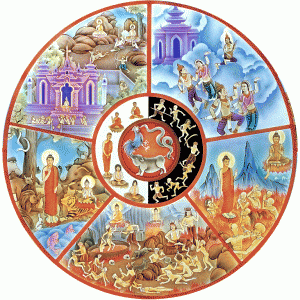Tweeting with the enemy

Dependent origination in the Buddhist cycle of life
Freelance copywriting (or any freelance work) can be a lonely business. Obviously, you write alone. But you also do your marketing, your finances and your planning alone. Not to mention your worrying – over deadlines, volume of work and pricing. And, of course, nobody understands. No-one else knows what it’s like to deal with criticism, non-payment, timewasting, mind-changing and downright rudeness – alone.
But social media has changed all that. Whereas before I might have known of one or two other copywriters – the ones I’d met through my salaried positions – I now ‘know’ many more, all around the world. I put ‘know’ in quotes because knowing someone through Twitter or a blog is not the same as knowing them for real. But it still feels enough like friendship to dispel much of the loneliness of the long-distance freelancer.
On the face of it, these other freelance copywriters are the competition. And this is true to the extent that freelance work is a zero-sum game (if I win, you lose, and vice versa). There is only one BP annual report, and only one writer can write it. There are only ten positions on page one of Google. There is, perhaps, only so much work and so much money to go round.
But this rather reductive viewpoint is just one way to make sense of the chaos that is the freelance marketplace. And, because we always remember that the map is not the territory, we are free to choose another way of seeing it.
For example, we could choose to believe in abundance: there is plenty to go around, and we can all share it. In this view, everything we do brings something new and unique into the world, with the power to create value and wealth. Work (or life) is not a race or a competition, but a collaborative creation – a never-endng play with an infinite number of actors. (Buddhists will note the parallel with the doctrine of paticcasamuppada, or dependent origination).
Web 2.0 enables us to share so much more – ideas, opportunities, resources and support. Ultimately, perhaps, it can even facilitate ‘co-opetition’, where nominally competing businesses or individuals realise they have more to gain from working together (at least in some areas), consciously shaping their industry rather than letting it emerge as the result of an unbridled, Darwinian free-for-all. This opens the door for achievements such as industry standards, best practice and (sometimes) a tacitly accepted approach to pricing that effectively freezes out undercutters. I wonder how far down that road our use of Twitter might take us.
Tags: Buddhism, co-opetition, dependent origination, Digital and social, Twitter, zero-sum game